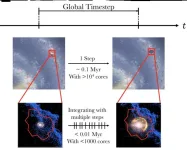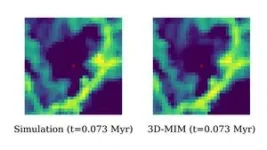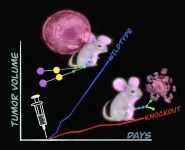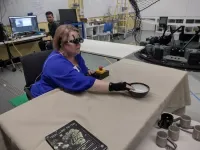(Press-News.org)
Supernovae, exploding stars, play a critical role in the formation and evolution of galaxies. However, key aspects of them are notoriously difficult to simulate accurately in reasonably short amounts of time. For the first time, a team of researchers, including those from The University of Tokyo, apply deep learning to the problem of supernova simulation. Their approach can speed up the simulation of supernovae, and therefore of galaxy formation and evolution as well. These simulations include the evolution of the chemistry which led to life.
When you hear about deep learning, you might think of the latest app that sprung up this week to do something clever with images or generate humanlike text. Deep learning might be responsible for some behind-the-scenes aspects of such things, but it’s also used extensively in different fields of research. Recently, a team at a tech event called a hackathon applied deep learning to weather forecasting. It proved quite effective, and this got doctoral student Keiya Hirashima from the University of Tokyo’s Department of Astronomy thinking.
“Weather is a very complex phenomenon but ultimately it boils down to fluid dynamics calculations,” said Hirashima. “So, I wondered if we could modify deep learning models used for weather forecasting and apply them to another fluid system, but one that exists on a vastly larger scale and which we lack direct access to: my field of research, supernova explosions.”
Supernovae occur when suitably massive stars burn through most of their fuel and collapse in enormous explosions. They are so huge that they can, and do, influence large areas inside their host galaxies. If a supernova had happened a few hundred years ago within a few hundred light-years from Earth, you might not be reading this article right now. So, the better we understand supernovae, the better we can understand why galaxies are the way they are.
“The problem is the time it takes to calculate the way supernovae explode. Currently, many models of galaxies over long time spans simplify things by pretending supernovae explode in a perfectly spherical fashion, as this is relatively easy to calculate,” said Hirashima. “However, in reality, they are quite asymmetric. Some regions of the shell of material that forms the boundary of the explosion are more complex than others. We applied deep learning to help ascertain which parts of the explosion require more, or less, attention during a simulation to ensure the best accuracy, whilst also taking the least amount of time overall. This way of dividing a problem is called Hamiltonian splitting. Our new model, 3D-MIM, can reduce the number of computational steps in the calculation of 100,000 years of supernova evolution by 99%. So, I think we’ll really help reduce a bottleneck too.”
Of course, deep learning requires deep training. Hirashima and his team had to run hundreds of simulations taking millions of hours of computer time (supercomputers are highly parallel, so this length of time would be divided amongst the thousands of computing elements required). But their results proved it was worth it. They now hope to apply their methodology to other areas of astrophysics; for example, galactic evolution is also influenced by large star-forming regions. 3D-MIM models the deaths of stars, and perhaps soon it will be used to model their births as well. It could even find use beyond astrophysics altogether in other fields requiring high spatial and temporal resolutions, such as climate and earthquake simulations.
###
Journal article: Keiya Hirashima, Kana Moriwaki, Michiko S. Fujii, Yutaka Hirai, Takayuki R. Saitoh, and Junichiro Makino. “3D-Spatiotemporal Forecasting the Expansion of Supernova Shells Using Deep Learning toward High-Resolution Galaxy Simulations”, Monthly Notices of the Royal Astronomical Society, DOI: 10.1093/mnras/stad2864
Funding:
This work was supported by JSPS KAKENHI Grant Numbers 22H01259, 22KJ0157, 20K14532, 21H04499, 21K03614, and 23K03446, and MEXT Grant Number JPMXP1020230406, and JPMXP1020200109 (hp200124). K.H. is financially supported by JSPS Research Fellowship for Young Scientists and accompanying Grants-in-Aid for JSPS Fellows (22J23077), JEES · Mistubishi corporation science technology student scholarship in 2022, and the IIW program of The University of Tokyo.
Related Press Releases:
"SoftNeuro" Enables 19x Faster Inference of 3D Simulation on Fugaku (2023/2/8)
Supporting 3D Simulation with Supercomputer Fugaku (2022/12/5)
Useful links:
Graduate School of Science - https://www.s.u-tokyo.ac.jp/en/
Department of Astronomy - http://www.astron.s.u-tokyo.ac.jp/en/
Research Center for the Early Universe - https://www.resceu.s.u-tokyo.ac.jp/top_en.php
GitHub Repository for the Model - https://github.com/kyaFUK/3D-MIM
Research contact:
Keiya Hirashima
Department of Astronomy, The University of Tokyo,
7-3-1 Hongo, Bunkyo-ku, Tokyo, 113-0033, Japan
hirashima.keiya@astron.s.u-tokyo.ac.jp
Associate Professor Michiko Fujii
Department of Astronomy, The University of Tokyo,
7-3-1 Hongo, Bunkyo-ku, Tokyo, 113-0033, Japan
fujii@astron.s.u-tokyo.ac.jp
Press contact:
Mr. Rohan Mehra
Public Relations Group, The University of Tokyo,
7-3-1 Hongo, Bunkyo-ku, Tokyo, 113-8656, Japan
press-releases.adm@gs.mail.u-tokyo.ac.jp
About The University of Tokyo
The University of Tokyo is Japan's leading university and one of the world's top research universities. The vast research output of some 6,000 researchers is published in the world's top journals across the arts and sciences. Our vibrant student body of around 15,000 undergraduate and 15,000 graduate students includes over 4,000 international students. Find out more at www.u-tokyo.ac.jp/en/ or follow us on Twitter at @UTokyo_News_en.
END
Kyoto, Japan -- An old campaign slogan for cough syrup, "It tastes awful. And it works," seemed to imply that any sweet content might have diminished the medicinal effect.
Sweetness, in the case of cancer, appears as a chain of sugar molecules attached to proteins by beta1,4-galactosyltransferase-3, or B4GALT3 According to the Cancer Genome Atlas, a high expression of this enzyme is associated with noticeably shortened survival rates in several types of immunotherapy cancers, such as neuroblastoma, ...
A patient at Oregon Health & Science University is the first in the world to benefit from a single stimulator implanted in the brain to effectively control two life-altering conditions: seizures caused by epilepsy and compulsive behavior caused by obsessive-compulsive disorder, or OCD.
Amber Pearson, 34, of Albany, said her seizures are under better control, but the relief from her psychiatric condition is profound.
“OCD is worse than having the seizures,” she said. “Epilepsy brings limitations to my life, but OCD controlled it.”
In the case study, published in the journal Neuron, co-authors from institutions across the ...
After surveying the views expressed by 41 advocacy, medical, and transplant-focused organizations on the Uniform Determination of Death Act, a brain injury expert is calling for much-needed reforms to the legal definition of death in the United States. The recently announced pause by the Uniform Law Commission, which is spearheading revisions, is disappointing, the expert notes, but should not permanently stall practical fixes to longstanding problems with the Death Act.
“This study shows that most medical ...
Older Black Americans are more likely to receive low value acute diagnostic tests than older White Americans, while older White Americans were more likely to receive low value screening tests and treatments, finds a study published by The BMJ today.
Low value care refers to services that provide little to no benefit yet have potential for harm, which can include laboratory tests, scans, and medication.
These differences were generally modest and were largely driven by differential treatment within health systems. But the researchers say the results “highlight ...
Patients with cancer whose oncologist receives payments from industry appear more likely to receive some non-recommended and low value treatments, finds a US study published by The BMJ today.
This finding raises potential concerns about quality of care, and the researchers say it may be appropriate to re-examine the current status of personal payments from the drug industry to physicians.
Research shows a consistent link between industry payments and prescribing behaviour, but whether payments to physicians have positive or negative consequences for patient care has not been evaluated empirically, say the ...
English hospital trusts have been accused of using foreign doctors as “cheap labour” as part of fellowship schemes in which they can be paid less than trust-employed doctors and sent home if they become pregnant, an investigation by The BMJ has found.
Foreign doctors come to English hospital trusts as “fellows” as part of the Academy of Medical Royal Colleges’ Medical Training Initiative (MTI) scheme, explains investigations editor, Madlen Davies.
They work for two years in the NHS to gain experience that they will take back to their home countries afterwards. A proportion of fellows are sponsored, for example by their ...
Over 200 health journals across the world have come together to simultaneously publish an editorial calling on world leaders and health professionals to recognise that climate change and biodiversity loss are one indivisible crisis and must be tackled together to preserve health and avoid catastrophe.
The authors say it’s a “dangerous mistake” to respond to the climate crisis and the nature crisis as if they were separate challenges, and urge the World Health Organization to declare this indivisible crisis as a global health emergency.
The editorial is published in leading titles from around ...
ustralian researchers have developed cutting-edge technology known as “acoustic touch” that helps people ‘see’ using sound. The technology has the potential to transform the lives of those who are blind or have low vision.
Around 39 million people worldwide are blind, according to the World Health Organisation, and an additional 246 million people live with low vision, impacting their ability to participate in everyday life activities.
The next generation smart glasses, which translate visual information into distinct sound icons, were developed by researchers from the University of Technology Sydney and the University of Sydney, ...
SAN FRANCISCO – A new study presented today at TCT 2023 sought to evaluate the presence of racial, ethnic, and socioeconomic inequities in access to mechanical circulatory support in the United States among patients with cardiogenic shock (CS). The findings, published in the Journal of the Society for Cardiovascular Angiography & Interventions (JSCAI), revealed stark disparities, particularly among Black patients, that further highlight systemic inequities in access to lifesaving therapies.
CS is a life-threatening condition in which your heart suddenly cannot pump enough blood to meet the body’s needs. As a result, your ...
A form of computerised attention and memory training can improve impaired attention and memory issues in women treated for breast cancer, University of Reading researchers have found.
‘Chemo-brain’ refers to cognitive problems like forgetfulness, difficulty concentrating, and lapses in everyday attention, which are common side effects of breast cancer treatments including chemotherapy.
The findings, published in the journal Psycho-Oncology, suggest that an adaptive “dual memory tracking” training program may help breast cancer survivors cope ...



